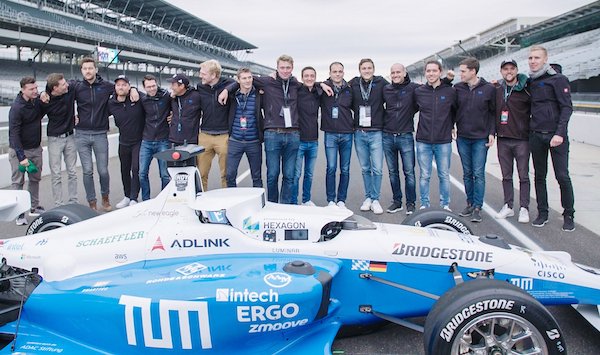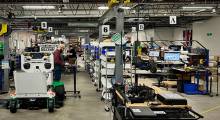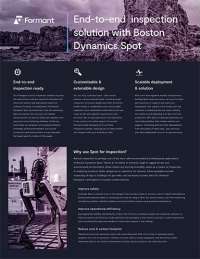TUM Autonomous Motorsport from the Technische Universität München, or the Technical University of Munich, yesterday won the Indy Autonomous Challenge Powered by Cisco. TUM competed in a field of nine teams from 21 universities to win the $1 million grand prize in the first autonomous racecar competition at the Indianapolis Motor Speedway.
The rules of the Indy Autonomous Challenge (IAC) required each team to compete in a fastest-lap competition that included an obstacle-avoidance component. The winning team recorded a two-lap average speed of 135.944 mph on the famed Indianapolis Motor Speedway (IMS) oval.
Organized by Energy Systems Network and the IMS, the IAC said its primary goal is to advance technology that can speed the development of advanced driver-assistance systems (ADAS) and the commercialization of fully autonomous vehicles (AVs). The organizers claimed the competition will lead to increased safety and performance in motor sports as well as all modes of commercial transportation.
Off to the races
On Thursday, Oct. 21, two of the nine finalist teams had breakthroughs, hitting the traction limit. The fastest cars went 135 to 140 mph, and while a few teams lost control over their vehicles on Turn 1, there were no crashes.
Indiana Gov. Eric J. Holcomb officially started yesterday's competition with the call, “Ladies and gentlemen, start your software and crank your engines!”
The IAC began with a welcome from Mark Miles, president and CEO of Penske Entertainment, and Paul Mitchell, president and CEO of Energy Systems Network. Lexi Smith, a senior from Indiana’s Mooresville High School, sang the U.S. national anthem.
This was followed by an official Telegrid Drone Express flyover, which delivered the green, white, and checkered flags to the official IAC flag waver, Boston Dynamics’ agile mobile robot Spot.
An exhibition from the IAC official racecar company, Dallara, followed with the Indy Racing Experience two-seater driven by professional racecar driver Gabby Chaves, with Brad Chambers, Indiana secretary of commerce in the passenger seat.
In addition, Dallara CEO Andrea Pontremoli drove the Dallara EXP with Luminar CEO Austin Russell in the passenger seat. The Dallara EXP was designed by The Dallara Group, and Giampaolo Dallara, founder and president of the company.
First-round leaders
Each team took warmup laps with their cars, which were built around common hardware and software platforms, including a 385 horsepower, four-cylinder engine. They then took two laps around the 2.5 mi. track, followed by a pass-fail obstacle-avoidance test.
In the opening round, the EuroRacing consortium took the lead with an average speed of 131.148 mph, despite not having had much time on the practice track. It was followed by TUM at 128.237 mph, PoliMOVE at 124.45 mph, and Cavalier Autonomous Racing at 119.883 mph.
PoliMOVE, the team from the Polytechnical University of Milan and the University of Alabama, had previously won the virtual round.
KAIST, a team with just four students from South Korea, ran an average speed of 84.35 mph. However, the Autonomous Tiger Racing and Black & Gold teams were unable to complete laps because of actuation problems.
The MIT-PITT-RW team suffered a crash, and the AI Racing Tech team from University of Hawai'i's car spun out into grass and had to be towed away.
TUM takes shootout
After a 131.148 average speed during the first round, the top three teams participated in the “shootout.” After hitting 158 mph in its practice raps, PoliMOVE experienced a crash in the first turn. The captain of the team said that its autonomous racecar lost its main GPS sensor and then its backup one at 123.45 mph.
After the German TUM team's run at IMS, the EuroRacing vehicle had a good run but slowed down to 124.5 mph during its second lap. The consortium captain said he suspected a programming problem.
In the end, the top three teams in the IAC were all from Europe.
“Participating in the Indy Autonomous Challenge allowed our team to advance autonomous driving technologies and being able to take first place after two years of hard work acknowledges that we had an outstanding team,” said Alex Wischnewski, team leader of TUM Autonomous Motorsport. “Our next goal is to win a high-speed, autonomous head-to-head race.”
“The prize money won by TUM Autonomous Motorsport will go to the Technische Universität München to support the university’s efforts to further autonomous technology research and development,” said Mitchell. Several of the competitors said they planned to continue competing in AV challenges.
IAC designed to advance AV tech
Among the goals of the Indy Autonomous Challenge were to serve as a platform for students to excel in science, technology, engineering, and mathematics (STEM) and to inspire the next generation of innovators.
In addition to thousands of attendees at the IMS and more than 20,000 viewers on the AWS livestream, the IAC hosted 350 high school STEM students representing more than 50 urban, rural, and suburban school districts across Indiana.
“The IAC would not be possible without the generous support of Lilly Endowment Inc. and the Indiana Economic Development Corp., which have been committed partners since the beginning,” said Energy Systems Network's Mitchell. “We know that the achievements of our IAC teams, alongside some of the best companies in the world, will certainly lead to the acceleration of Indiana’s AI and automation industries well into the future.”
Article topics
Email Sign Up



















